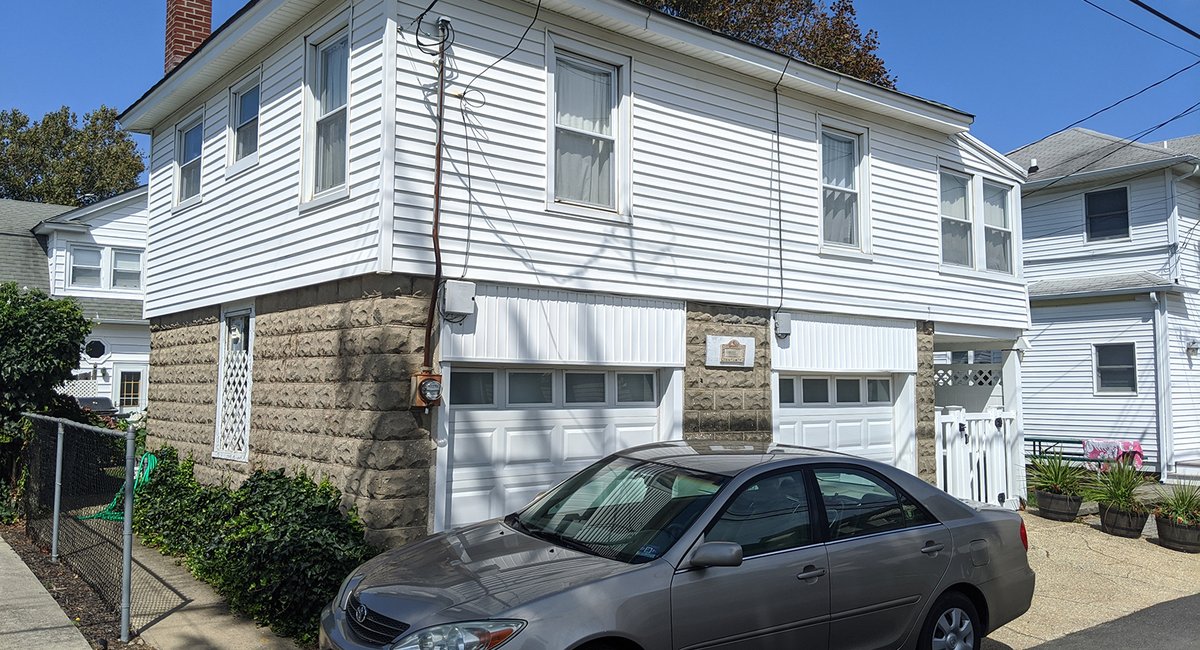When the Avon-by-the-Sea, New Jersey home where Brian Staub’s mother lived alone became more than she needed in 1998, Brian bought it from her and moved in. His mother didn’t go far — she moved into the garage apartment out back.
“And the beauty of it is I was able to kind of keep an eye on my mom and she was able to continue to stay in Avon near the shore,” Staub said.
Many homes in Avon have garage apartments like theirs. And while their mother still owned the main house, Staub and his brothers would spend some summers staying in the apartment. The family rented it out in other years.
The borough passed a law about 20 years ago that bans new garage apartments, though it allows for improvements to already-existing ones.
“I think they were concerned maybe about overpopulation,” Staub said. “But I think that should change because it’s such a nice feature to be able to have the older generation in the back and keep the family together.”
Many New Jersey towns entirely bar these “accessory dwelling units,” or ADUs — secondary apartments that are on the same lot as a main home, sometimes attached to the house. Other towns allow them, but only if the occupant is related to the main home’s residents, or older than a certain age. But new proposed state legislation would require all towns statewide to allow ADUs, and would bar many of the types of restrictions that towns impose.
Some community leaders see it as an opportunity to make more cost-effective housing available, including for seniors being priced out of communities by the state’s notoriously high property taxes. But it’s seeing opposition from the League of Municipalities that advocates for local officials’ interests across the state. The league argues it takes too much power away from local governments, and calls it a “strict preemption of local land use and zoning controls.”
The league also opposes language that says if a town denies someone’s application to build an ADU, they can appeal that decision to the state.
“While there are no doubt benefits to be derived from the construction of ADUs, those benefits are only possible with effective local planning and management,” the group said in a statement on its website.
The proposal comes as legislators prioritize housing legislation this session, including a massive affordable housing bill that would overhaul the process for determining each town’s affordable housing obligation. New Jersey assigns those obligations in rounds, with the next beginning in 2025.
The ADU legislation has passed the state Senate’s community and urban affairs committee, but will likely need to go through multiple hearings in both the Senate and Assembly before any vote by the full bodies.
High costs, little space
Some New Jersey town officials and housing advocates see allowing ADUs as an important tactic for increasing access to housing in a state beset with high real estate prices and property taxes – as well as a lack of land for building new structures on in many towns, as noted by Dean Dafis, a town councilmember and former mayor of Maplewood.
“We just don’t have space. The only way we can go is up,” he said.
California, Oregon and Connecticut have also legalized ADUs statewide in recent years.
“Accessory dwelling units are a tool in the toolbox to create more inclusive, affordable communities.” said Christina Kata, New Jersey policy associate at the Regional Plan Association, a nonprofit civic organization for the tristate area.
A recent survey by the Regional Plan Association found that 65% of New Jersey respondents supported legalizing ADUs.
The concept also has the full support of the country’s most well-known association for retirees, the AARP. It recently applauded the U.S. Department of Housing and Urban Development’s new federal policy aimed at allowing more homeowners to obtain federal financing to build ADUs on their properties. The AARP also provides draft state legislation and local ordinance language on its website.
A handful of New Jersey towns have passed their own ADU ordinances over the last several years. Maplewood, Montclair, Princeton and South Orange have recently adopted rules to allow ADUs in their communities, according to the Regional Plan Association. Newark and Teaneck also added legalizing ADUs to their latest master plans, which towns typically write every 10 years to outline their vision for their future.
“ADUs are nothing new. It was grandma’s basement. It was your parents’ attic. It was the extra bedroom that you left when you went off to college,” said Chris Watson, Newark’s former director of city planning.
He said many Newark homes already include unauthorized ADUs, but the new legislation could “bring them out of the shadows,” and better protect occupants by making them subject to inspections and municipal oversight.
Teaneck Mayor Michael Pagan said his township’s officials are trying to address a lack of options for seniors.
“We have a housing crisis – everything keeps going up except wages. And if you’re living on a fixed income, like our senior citizens, it’s hard to find something that is affordable,” he said.
Elizabeth Davis, executive director at Bright Side Family, a Teaneck-based nonprofit focused on creating affordable and supportive housing for seniors in Bergen County, said demand for affordable options for older New Jerseyans outpaces supply.
“We opened a 62-unit building in 2016, I probably have close to a thousand names on the waiting list,” Davis said. “We get calls all of the time from older adults desperately seeking housing and it’s heartbreaking.”
Pagan said he sees ADUs as a way for seniors who would otherwise have a hard time staying in the town they’ve lived in for years to age in place.
“It’s one of the best ways to keep older adults in the towns they want to live in, and it’s also one of the best ways for people who might not be economically comfortable to find a home – even though they’re small,” he said.
Experiences with ADUs so far
The New Jersey towns that have run with the ADU idea are experiencing mixed results. Maplewood’s Dafis said only “a handful” have been built since the township committee first adopted their ordinance about four years ago.
But officials have updated their rules over that time to encourage more ADUs. Dafis said they did away with the initial ordinance’s restriction that required occupants to be 62 or older. Now, he said, they’ve written into their master plan that they should take a look at other restrictions – like a rule that the ADU must be constructed with the same materials as the main house.
Princeton is unique among the New Jersey towns that have taken on this idea because it allows residents to sell their ADU. Mia Sacks, council president in Princeton — where the median home price is more than $1 million — said some residents were up in arms about the idea when it was first introduced because they feared the “erosion of the character of neighborhoods.”
“But the sky didn’t fall, the world did not come to an end,” she said.
Sacks said that since Princeton’s ordinance was adopted in 2020, 38 ADUs have been built and “four to six” have been sold according to the town’s records.
“So, clearly, this has not destroyed the character of the town. And the vast majority are being used for exactly what we intended, which is for personal extended familial use,” Sacks said.
She said ADUs are “creating a layer of housing that simply does not otherwise exist in Princeton in any way, shape or form.”
The legislation’s current draft says that variations on the state’s model ordinances would require the Department of Community Affairs’ approval. And while Sacks said she’s supportive of ADUs becoming a statewide initiative, she said she’d like to see towns maintain some control over how they are instituted.
“We spent about 18 months painstakingly working on our ordinance in a way that it fit the built environment and the character of our town so that we were providing gentle density,” she said.
Dafis said he also supports the Legislature getting involved with ADUs, but said he’d like to see the Legislature incorporate incentives for the towns already doing this, such as a tax credit or rebate that could offset the cost of construction.
“Don’t give us some sort of minimum threshold that we have to meet. We’re ahead of that. We’ve done that,” he said.


Leave a Reply